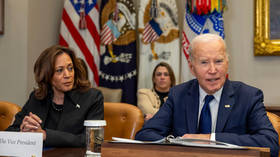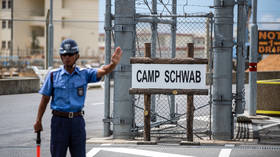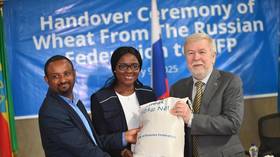‘Further welfare cuts will plunge disadvantaged children deeper into poverty,’ say experts

The number of youngsters living in relative poverty in Britain has fallen to its lowest level since the 1980s, new government figures claim. However, critics say these figures are cherry picked and obscure the true face of child poverty.
Figures released by the Department for Work and Pensions (DWP) suggest the number of youngsters living in relative poverty in Britain has fallen to 2.3 million. Observers say this drop is so small (100,000), it’s statistically insignificant.
The DWP’s report, Households Below Average Income, was published on Thursday. It made a number of estimates based on “relative poverty” and “absolute poverty” measures respectively.
Relative poverty occurs when a household lacks the minimum income needed to maintain an average standard of living. Absolute poverty is defined as living in a household that earns less than 60 percent of the national average wage.
How to reduce child poverty, Tory-style: just change the definition. http://t.co/FBVPxoY2Ie
— Owen Jones (@OwenJones84) June 24, 2015
Following the release of the DWP’s report, Work and Pensions Secretary Iain Duncan Smith suggested the proportion of Britons living in low-income households has hit a 30-year low.
But Duncan Smith’s claim was dismissed by Britain’s Institute for Fiscal Studies, which said the report shows “little or no change in poverty rates – for the population as a whole and for the major demographic groups.”
The DWP report suggests households occupied by at least one disabled person experienced a rise in absolute poverty of 300,000 – bringing the total figure to 5.6 million.
Its figures showed households deemed to be in relative poverty remained flat at 4.1 million.
Child poverty rising among hard working families.... https://t.co/GjDndrMNO7
— Ann Pettifor (@AnnPettifor) June 25, 2015
UK think tank Poverty and Social Exclusion (PSE) argues definitions of poverty “really matter.”
“They set the standards by which we determine whether the incomes and living conditions of the poorest in society are acceptable or not, and are essential for determining questions of fairness,” the group said.
In Britain, these definitions are currently under review as the Conservative Party seeks to alter the criteria used to monitor and estimate child poverty.
The PM discussed these changes with a group of fellow party members on Tuesday morning.
“Just take the historic approach to tackling child poverty,” he said. “Today, because of the way it is measured, we are in the absurd situation where if we increase the state pension, child poverty actually goes up.”
‘200,000 children in deeper poverty’
Following the release of the DWP’s report, Children’s Society Chief Executive Matthew Reed said a further 200,000 children have been pushed “deeper into poverty” over the past year.
“There has also been a steady rise over the last five years in the numbers of children living in in-work poverty – clearly showing that even those families with jobs are suffering because of government policies,” he said.
The Tories want to hide the effects of their policies on child poverty, Nick Clegg says http://t.co/xcaUxLmvTQ
— nyko (@nykonews) June 25, 2015
Child Poverty Action Group (CPAG) said the DWP’s figures make for “grim reading.”
“We are facing a child poverty crisis in the years ahead and the government is not going to meet the child poverty targets it signed up to,” CPAG Chief Executive Alison Garnham said.
“Rather than opening up opportunity, the UK is now going down the road of closing down life chances for hundreds of thousands of children in low income families.”
Garnham said there are half a million more youngsters living in poverty under the government’s “preferred absolute poverty measure” than in 2010.
She predicted the crisis would deepen if the Tories plow ahead with planned welfare cuts.
“You don’t tackle low pay by making the low paid poorer. You don’t tackle child poverty by slashing targeted help for children in low income families and then claiming money doesn’t matter,” she said.
Labour's Chris Leslie on child poverty: "They should focus now on tackling low pay, not attacking the low-paid." http://t.co/1crh3sATQd
— PoliticsHome (@politicshome) June 25, 2015
Garnham attacked the government’s poverty-reduction strategy, warning it is utterly misguided.
“It is low pay, the lack of adequate childcare, and cuts to children’s benefits we should look to for an explanation of child poverty and not to parents who struggle daily to protect their children against its worst effects,” she said.
Garnham called upon the government to address the root causes of poverty instead of highlighting its symptoms.
“[The government] needs to protect children’s benefits with the same triple lock protection pensions enjoy, fix the deep cuts to tax credits help for the low paid, tackle cripplingly high rents, high childcare costs and extend the good work it’s done on free school meals,” she said.
Echoing Child Poverty Action, social justice group the Fabian Society warned against further welfare cuts.
“Significant cuts to tax credits will lead to higher child poverty and worse life chances for young people from disadvantaged homes,” a spokesperson for the group said.












